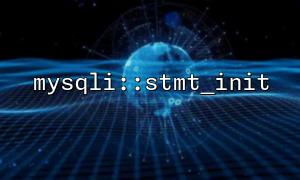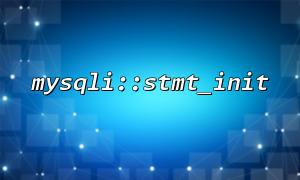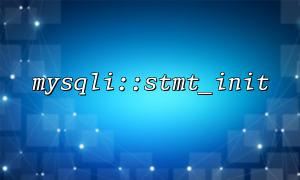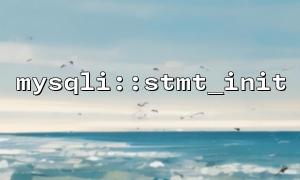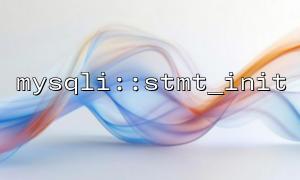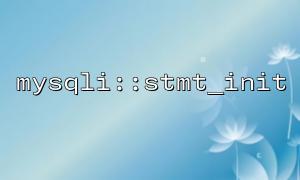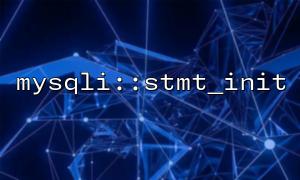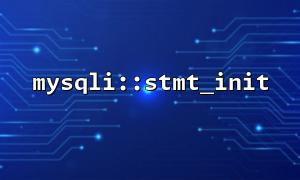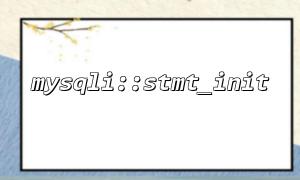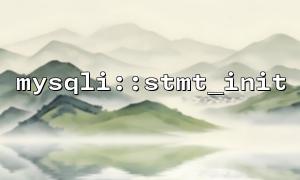During PHP development, it is common to use mysqli extensions for database operations. The mysqli::stmt_init function is used to initialize a preprocessing statement, which is very important for improving the security and efficiency of SQL queries. However, when performing unit testing, due to the existence of database connections, how to effectively test the database operation method containing the mysqli::stmt_init function becomes a difficult problem.
This article will introduce how to unit test in PHP, especially how to test database operation methods containing mysqli::stmt_init . We will use PHP's unit testing framework - PHPUnit, and combine some Mock objects and database simulation tools to simulate database operations and avoid direct interaction with the database.
First, we create a simple database operation class that contains a database operation method using mysqli::stmt_init . The code example is as follows:
<?php
class Database
{
private $connection;
public function __construct($host, $username, $password, $dbname)
{
$this->connection = new mysqli($host, $username, $password, $dbname);
if ($this->connection->connect_error) {
die("Connection failed: " . $this->connection->connect_error);
}
}
public function prepareAndExecute($query, $params)
{
$stmt = $this->connection->stmt_init();
if ($stmt->prepare($query)) {
$stmt->bind_param(...$params);
$stmt->execute();
return $stmt->get_result();
} else {
throw new Exception('Query preparation failed');
}
}
}
In this class, prepareAndExecute method uses the mysqli::stmt_init function to initialize a preprocessing statement and execute the incoming SQL query.
In order to test this database operation class, we need to simulate the mysqli::stmt_init function and related database operations. We use PHPUnit and Mockery to create a mocked mysqli object to avoid real database interactions while testing.
Here is the unit test code:
<?php
use PHPUnit\Framework\TestCase;
use Mockery;
class DatabaseTest extends TestCase
{
private $db;
private $mockConnection;
public function setUp(): void
{
$this->mockConnection = Mockery::mock('mysqli');
$this->db = new Database('localhost', 'user', 'password', 'test_db');
$this->db->connection = $this->mockConnection;
}
public function testPrepareAndExecute()
{
// Mock stmt_init to return a mocked statement object
$mockStmt = Mockery::mock('mysqli_stmt');
$this->mockConnection->shouldReceive('stmt_init')->once()->andReturn($mockStmt);
// Mock the prepare method to return true
$mockStmt->shouldReceive('prepare')->once()->andReturn(true);
$mockStmt->shouldReceive('bind_param')->once();
$mockStmt->shouldReceive('execute')->once();
$mockStmt->shouldReceive('get_result')->once()->andReturn(true);
// Call the method
$result = $this->db->prepareAndExecute('SELECT * FROM users WHERE id = ?', ['i', 1]);
// Assert that the result is true
$this->assertTrue($result);
}
public function tearDown(): void
{
Mockery::close();
}
}
In this test, we use Mockery to simulate mysqli and mysqli_stmt objects, and check whether the prepareAndExecute method correctly performs prepare , bind_param , execute and other operations.
Make sure you have PHPUnit and Mockery installed. You can install it through the following command:
composer require --dev phpunit/phpunit mockery/mockery
Then, you can run the test:
php vendor/bin/phpunit DatabaseTest.php
If the test passes, you will see a message similar to the following:
OK (1 test, 1 assertion)
By using the Mock object and the PHPUnit framework, we are able to effectively test the database operation method containing mysqli::stmt_init without interacting with the actual database. This allows us to ensure the correctness of the database operation logic while avoiding dependency on the availability of the database in unit tests.
The above is an introduction to how to unit test the database operation method containing the mysqli::stmt_init function. Hope this article can help you and enable you to perform PHP unit testing more efficiently.


